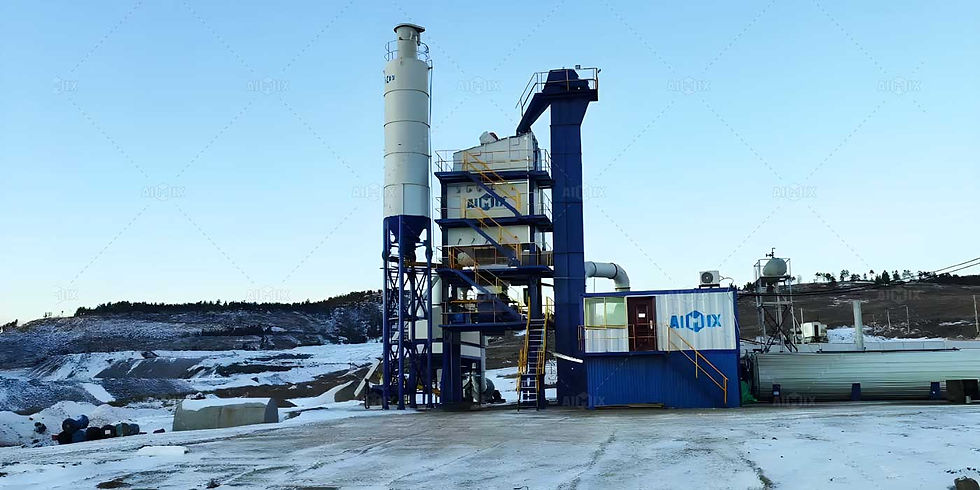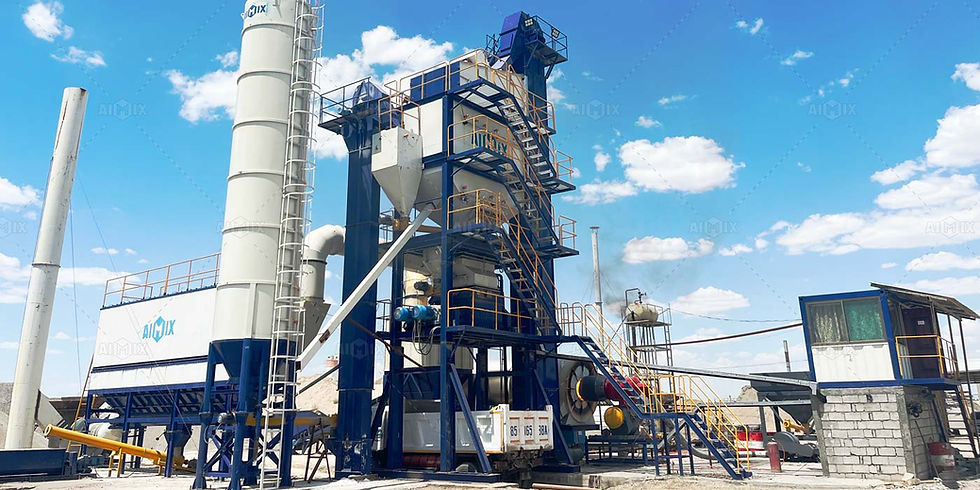How Does a Mobile Asphalt Mixing Plant Differ from a Stationary Asphalt Mixing Plant?
- aimixglobal5
- May 28, 2024
- 3 min read
When it comes to asphalt production, the choice between a mobile asphalt mixing plant and a stationary asphalt mixing plant can significantly impact your project's efficiency and flexibility. Understanding the key differences between these two types of plants will help you make an informed decision.
Flexibility and Mobility
A mobile asphalt plant offers unparalleled flexibility. It can be transported from one site to another with ease, making it ideal for projects that require frequent location changes. This mobility ensures that you can produce asphalt close to your construction site, reducing transportation costs and time. In contrast, a stationary asphalt plant remains fixed in one location, making it suitable for large, long-term projects where the production site does not change.
Installation and Setup Time
The installation process for a mobile asphalt mixing plant is straightforward and quick. These plants are designed for easy setup and dismantling, which can save valuable time. Typically, a mobile plant can be operational within a few days. On the other hand, a stationary asphalt plant requires a more complex setup process. The installation involves laying foundations and connecting utilities, which can take several weeks to complete.
Production Capacity
Stationary asphalt plants are often capable of higher production capacities compared to their mobile counterparts. They are designed to handle large volumes of asphalt continuously, making them ideal for major infrastructure projects. Mobile asphalt mixing plants, while efficient, generally have a lower production capacity. They are better suited for smaller projects or for use as supplementary equipment on larger sites.

Cost Considerations
When evaluating costs, it's essential to consider both initial investment and operational expenses. Mobile asphalt plants tend to have a lower initial cost because they do not require extensive foundation work. However, their frequent relocation can incur additional operational costs. Stationary asphalt plants have a higher upfront cost due to the need for permanent infrastructure. Despite this, their operational costs may be lower over time, especially for long-term projects, due to their higher efficiency and production capacity.
Maintenance and Durability
Both mobile and stationary asphalt plants require regular maintenance to ensure optimal performance. Mobile asphalt batching plant, due to their frequent movement, might need more frequent checks and minor repairs. However, they are built to withstand the rigors of transportation and setup. Stationary plants, while robust and designed for long-term use, require less frequent but more intensive maintenance checks due to their larger size and complexity.
Environmental Impact
Environmental considerations are increasingly important in construction projects. Mobile asphalt mixing plants typically have a smaller environmental footprint because they can be located closer to the construction site, reducing emissions from transportation. They also usually incorporate modern technologies to minimize emissions. Stationary plants, while larger, often have more advanced pollution control systems installed, making them environmentally friendly despite their size.

Choosing the Right Asphalt Plant for Your Needs
The decision between a mobile and stationary asphalt mixing plant depends on various factors, including the scale and duration of your project, budget constraints, and environmental considerations. For projects that require frequent site changes and have a shorter duration, a mobile asphalt plant offers the flexibility and convenience needed. For larger, long-term projects with higher production demands, a stationary asphalt plant provides the necessary capacity and efficiency.
Ultimately, understanding the specific requirements of your project will guide you in making the best choice. Both mobile and stationary asphalt plants have their unique advantages, and selecting the right one will ensure the success of your asphalt production operations.
Conclusion
In summary, both mobile and stationary asphalt mixing plants play crucial roles in the construction industry. Their differences in flexibility, setup time, production capacity, costs, maintenance, and environmental impact are significant. By carefully considering these factors, you can choose the plant that best meets your project's needs and ensures efficient, high-quality asphalt production. Whether you opt for the mobility of a portable asphalt plant or the robust capacity of a stationary one, understanding these distinctions will lead to more informed decisions and successful project outcomes. Contact AIMIX for more information!







Comments